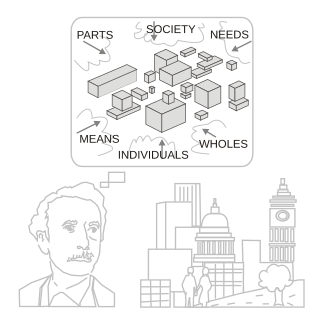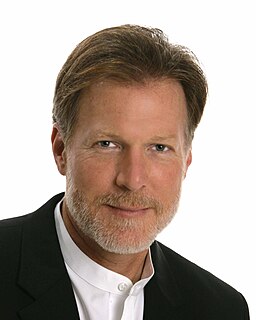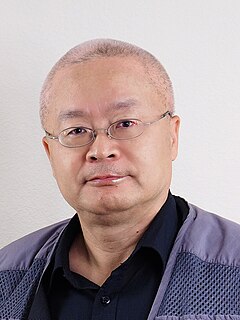Systems theory is the interdisciplinary study of systems, i.e. cohesive groups of interrelated, interdependent components that can be natural or human-made. Every system has causal boundaries, is influenced by its context, defined by its structure, function and role, and expressed through its relations with other systems. A system is "more than the sum of its parts" by expressing synergy or emergent behavior.

Reductionism is any of several related philosophical ideas regarding the associations between phenomena, which can be described in terms of other simpler or more fundamental phenomena. It is also described as an intellectual and philosophical position that interprets a complex system as the sum of its parts.
In the context of systems science and systems philosophy, systemics is an initiative to study systems. It is an attempt at developing logical, mathematical, engineering and philosophical paradigms and frameworks in which physical, technological, biological, social, cognitive and metaphysical systems can be studied and modeled.

Systems Science, also referred to as Systems Research, or, simply, Systems, is an interdisciplinary field concerned with understanding systems—from simple to complex—in nature, society, cognition, engineering, technology and science itself. The field is diverse, spanning the formal, natural, social, and applied sciences.

Sociocybernetics is an interdisciplinary science between sociology and general systems theory and cybernetics. The International Sociological Association has a specialist research committee in the area – RC51 – which publishes the (electronic) Journal of Sociocybernetics.

Béla Heinrich Bánáthy was a Hungarian-American linguist, and Professor at San Jose State University and UC Berkeley. He is known as founder of the White Stag Leadership Development Program, established the International Systems Institute in 1982, and was co-founder of the General Evolutionary Research Group in 1984.
James Grier Miller was an American biologist, a pioneer of systems science and academic administrator, who originated the modern use of the term "behavioral science", founded and directed the multi-disciplinary Mental Health Research Institute at the University of Michigan, and originated the living systems theory.
A system is a group of interacting or interrelated elements that act according to a set of rules to form a unified whole. A system, surrounded and influenced by its environment, is described by its boundaries, structure and purpose and expressed in its functioning. Systems are the subjects of study of systems theory and other systems sciences.
The International Federation for Systems Research(IFSR) is an international federation for global and local societies in the field of systems science. This federation is a non-profit, scientific and educational agency founded in 1980, and constituted of some thirty member organizations around the globe..
Debora Hammond is an American historian of science, former Provost and Professor Emerita of Interdisciplinary Studies of the Hutchins School of Liberal Studies at the Sonoma State University. She is known as author of the 2003 book The Science of Synthesis: Exploring the Social Implications of General Systems Theory, and as 2005–06 President of International Society for the Systems Sciences.
Kenneth D. Bailey is an American sociologist, systems scientist and professor of sociology at the University of California in Los Angeles.
The International Society for the Systems Sciences (ISSS) is a worldwide organization for systems sciences. The overall purpose of the ISSS is:

Stuart Anspach Umpleby is an American cybernetician and professor in the Department of Management and Director of the Research Program in Social and Organizational Learning in the School of Business at the George Washington University.
Béla Antal Bánáthy is an American systems scientist, who teaches part-time at the International Systems Institute at the Saybrook Graduate School.

Gary S. Metcalf is an American systems scientist, organizational theorist, management consultant, and university professor. He has served as president of the International Federation for Systems Research since 2010.
Viable system theory (VST) concerns cybernetic processes in relation to the development/evolution of dynamical systems. They are considered to be living systems in the sense that they are complex and adaptive, can learn, and are capable of maintaining an autonomous existence, at least within the confines of their constraints. These attributes involve the maintenance of internal stability through adaptation to changing environments. One can distinguish between two strands such theory: formal systems and principally non-formal system. Formal viable system theory is normally referred to as viability theory, and provides a mathematical approach to explore the dynamics of complex systems set within the context of control theory. In contrast, principally non-formal viable system theory is concerned with descriptive approaches to the study of viability through the processes of control and communication, though these theories may have mathematical descriptions associated with them.
Autonomous agency theory (AAT) is a viable system theory (VST) which models autonomous social complex adaptive systems. It can be used to model the relationship between an agency and its environment(s), and these may include other interactive agencies. The nature of that interaction is determined by both the agency's external and internal attributes and constraints. Internal attributes may include immanent dynamic "self" processes that drive agency change.

Jason Jixuan Hu, is a Chinese American cyberneticist, independent scholar and managing director of WINTOP Organizational Learning Laboratory. He is noted for his work on "cognitive capacity in human communication, conflict resolution and cooperation solicitation," and on view on distance education in America.
David Rousseau is a British systems philosopher, Director of the Centre for Systems Philosophy, chair of the Board of Trustees of the International Society for the Systems Sciences (ISSS), a Past President of the ISSS (2017-2018), and the Company Secretary of the British Association for the Study of Spirituality. He is known for having revived interest in establishing a scientific general systems theory (GST), for promoting systems philosophy as a route to advances in GST, for contributions on scientific general systems principles and for advocating systems research as a route to a scientific understanding of spiritual and other exceptional human experiences. His research interests include systems philosophy, systems science, systems engineering, systems methods for exploratory research, the mind-body problem, and the ontological foundations of moral intuitions.








